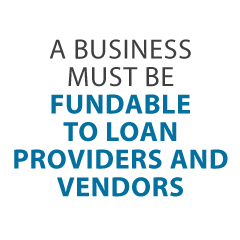Will a Fundation Loan Satisfy Your Need for Business Funding? We Put It to the Test
Fundation Group LLC is one of many lending companies online. According to their website, “Fundation has combined with ODX to form Linear Financial Technologies”.
It does not appear that they will be offering term loans and lines of credit any more. We looked at the specifics and drill down into the details with respect to the Fundation company. Welcome to our Fundation review.
Note: this review was updated on March 15, 2021 and should now be considered to be out of date.
Background
Fundation Group LLC is located online here: https://www.fundation.com. Their physical address is located in Reston, VA. Plus you can call them at: (888) 390-0064. So their contact page is here: https://fundation.com/about.
Their capital base has come from Goldman Sachs; Garrison Investment Group; Waterfall Asset Management; and Midcap Financial, LLC.
Term Loans
They do not seem to have an options for Fundation business loans anymore.
Lines of Credit
Up to $150,000 is available. Term credit up to $500,000 up to 60 months for customers that want to minimize payments.
They do not seem to have a time in business requirement anymore. Fundation also does not seem to have an annual revenue or personal credit requirement anymore.
Fees for Fundation Lending
Fundation says,
“There are a number of variables that go into determining pricing like who your customers are, the size of the transactions we will finance, the type of transactions we are financing, and the basic characteristics of your company (e.g., how long have you been doing this). The rate paid by your customer can be reduced (subsidized) by you through a discount on the proceeds that we remit to you. Many of our clients use this approach.“
Advantages
Advantages include no apparent time in business requirement. Their maximum loan amount is fairly high.
Disadvantages
Disadvantages are their fees are hard to determine.
A Fantastic Alternative – Establishing Business Credit
Business credit is credit in a small business’s name. It doesn’t attach to an owner’s individual credit, not even when the owner is a sole proprietor and the solitary employee of the small business.
As such, a business owner’s business and individual credit scores can be very different.
The Advantages
Because business credit is distinct from personal, it helps to protect a small business owner’s personal assets, in case of a lawsuit or business bankruptcy.
Also, with two distinct credit scores, a small business owner can get two different cards from the same merchant. This effectively doubles buying power.
Another benefit is that even startup ventures can do this. Visiting a bank for a business loan can be a formula for disappointment. But building small business credit, when done right, is a plan for success.
Personal credit scores depend upon payments but also other factors like credit utilization percentages.
But for small business credit, the scores actually only depend on whether a business pays its invoices punctually.
The Process
Establishing company credit is a process, and it does not occur without effort. A company has to actively work to establish company credit.
However, it can be done readily and quickly, and it is much quicker than establishing consumer credit scores.
Vendors are a big aspect of this process.
Performing the steps out of sequence will cause repetitive denials. Nobody can start at the top with small business credit.
Business Fundability™
A company must be Fundable to credit issuers and vendors.
For that reason, a company will need a professional-looking web site and e-mail address. And it needs to have site hosting from a company like GoDaddy.
And, company phone numbers must have a listing on ListYourself.net.
In addition, the company telephone number should be toll-free (800 exchange or the equivalent).
A small business will also need a bank account devoted strictly to it, and it needs to have all of the licenses essential for operation.
Licenses
These licenses all must be in the perfect, appropriate name of the company. And they must have the same business address and phone numbers.
So keep in mind, that this means not just state licenses, but potentially also city licenses.
Dealing with the Internal Revenue Service
Visit the IRS web site and acquire an EIN for the small business. They’re totally free. Select a business entity such as corporation, LLC, etc.
A company can get started as a sole proprietor. But they should switch to a kind of corporation or an LLC.
This is in order to minimize risk. And it will make best use of tax benefits.
A business entity will matter when it pertains to tax obligations and liability in case of litigation. A sole proprietorship means the business owner is it when it comes to liability and taxes. No one else is responsible.
Sole Proprietors Take Note
If you operate a company as a sole proprietor, then at least be sure to file for a DBA. This is ‘doing business as’ status.
But see any DBA as a stepping stone to incorporating. A corporation is truly separate from its owner.
Setting off the Business Credit Reporting Process
Begin at the D&B web site and get a free D-U-N-S number. A D-U-N-S number is how D&B gets a business into their system, to produce a PAYDEX score. If there is no D-U-N-S number, then there is no record and no PAYDEX score.
Once in D&B’s system, search Equifax and Experian’s websites for the company. You can do this at www.creditsuite.com/reports. If there is a record with them, check it for accuracy and completeness. If there are no records with them, go to the next step in the process.
By doing this, Experian and Equifax will have something to report on.
https://creditsuite.wistia.com/medias/tzam7150ub?embedType=async&videoFoam=true&videoWidth=640
Vendor Credit
First you must build trade lines that report. This is also referred to as vendor credit. Then you’ll have an established credit profile, and you’ll get a business credit score.
And with an established business credit profile and score you can begin to get more credit.
These sorts of accounts have the tendency to be for the things bought all the time, like marketing materials, shipping boxes, outdoor work wear, ink and toner, and office furniture.
But first off, what is trade credit? These trade lines are credit issuers who will give you initial credit when you have none now. Terms are often Net 30, rather than revolving.
So, if you get approval for $1,000 in vendor credit and use all of it, you must pay that money back in a set term, such as within 30 days on a Net 30 account.
Monitor Your Business Credit
Know what is happening with your credit. Make certain it is being reported and deal with any mistakes ASAP. Get in the practice of taking a look at credit reports. Dig into the particulars, not just the scores.
We can help you monitor business credit at Experian, Equifax, and D&B for 90% less.
Update Your Data
Update the details if there are inaccuracies or the details is incomplete.
Fix Your Business Credit
So, what’s all this monitoring for? It’s to contest any mistakes in your records. Mistakes in your credit report(s) can be corrected. But the CRAs normally want you to dispute in a particular way.
Disputes
Disputing credit report errors typically means you precisely itemize any charges you contest.
A Word about Building Business Credit
Always use credit responsibly! Don’t borrow beyond what you can pay off. Track balances and deadlines for repayments. Paying punctually and fully will do more to boost business credit scores than pretty much anything else.
Building business credit pays. Great business credit scores help a business get loans. Your credit issuer knows the business can pay its financial obligations. Because they know the company is bona fide.
The business’s EIN attaches to high scores and loan providers won’t feel the need to demand a personal guarantee.
Business credit is an asset which can help your business for years to come. Learn more here and get started toward growing company credit.
Upshot
A company needing higher amounts will likely do better with Fundation, which could be one of the best online lending companies for them. But there are negatives.
Entrepreneurs will find they have to give up a personal guarantee and, on top of that, have a UCC blanket lien held by Fundation. A company that fails and ends up going out of business could be particularly harsh for an entrepreneur – so companies which are unsure of the chances of their success would do well to seek out other types of funding, where they either hand over a personal guarantee or a UCC blanket lien but not both.
And finally, as with every other lending program, whether online or offline, always remember to read the fine print and do the math. Go over the details with a fine-toothed comb, and decide whether this option will be good for you and your company. In addition, consider alternative financing options that go beyond lending, including building business credit, in order to best decide how to get the money you need to help your business grow.


